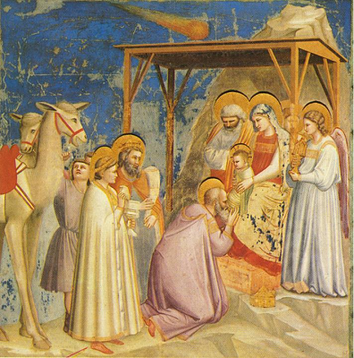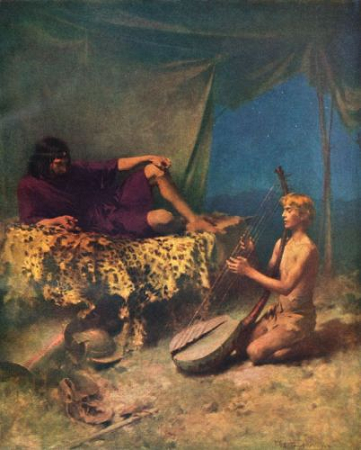
One Saint continues with selected quotations from Ernest L Martin's work, The Star of Bethlehem: The Star that Astonished the World. It is recommended you access this magnificent tome for yourselves. You can read or listen to the entire book for free at the ASK ELM website.
You can also listen to David Sielaff’s wonderful audio interview with George Ann Hughes at the Byte Show. These files bring us up to date, for David Sielaff continues the work of Ernest L Martin. You will find the full interview at The Byte Show. Scroll way down to The Star of Bethlehem series, in fourteen parts.
Also available are all eleven parts of The Star of Bethlehem interviews Ernest L Martin did with Jeff Rense at ASK ELM:
Who Were the Wise Men? (Chapter Two)
"These Magi came from the east bearing rich gifts for the newborn king. They could not have been reckoned as certain classes of sorcerers and confidence men who roamed the Roman world under the name “Magi.” Herod and all Jerusalem would hardly have been troubled by what they considered impostors. But if the Magi had come from the court of the Parthian kings who employed Magi in the religious affairs of their government, or from the respected Magian colleges of the east, then that would have been a different matter in the view of Herod and the Jewish authorities in Jerusalem.
"In order to have an audience with Herod and for him to have members of the Sanhedrin (the Supreme Court of the Jews) to hear the interpretations of these Magi must show that they were held in high esteem by the people of Jerusalem. In their deportment, it was customary for the Magi to dress in magnificent priestly attire to indicate their professional status. In presenting themselves before royalty the historical records show that the Magi did this with pomp and circumstance. 4 In traveling or on official business in areas where their influence was felt, it was normal for the priestly Magi to proceed in a processional mode with various ranks of them appropriately positioned in the caravan. This must have been the manner in which they approached the city of Jerusalem to present their gifts to the newborn king of the Jews. This would account for the respectful attitude of Herod and the Jewish authorities to them.
"The prophet Daniel must have been assigned to this high office. Perhaps the fraternization of Daniel with the early Magi in Babylon helps to explain why those in the Magian profession expected a Jewish king to arrive near the end of the 1st century. This is the very thing that Daniel prophesied would happen. Recall that Daniel prophesied the rebuilding of Jerusalem after the Babylonians destroyed it in the 6th century B.C.E. He also said that 490 years would pass from a command to rebuild Jerusalem until a world-embracing messianic kingdom would emerge on the earth in the region of Palestine.
"Most Jews admired the Magi of the east. This was not only because of their former association with the prophet Daniel, but also because they were not idolaters. Though the Magi believed that the power of the deity was manifested in the natural elements of fire, water, air and earth, these Gentile priests did not set up material images in recognition of him. They were, in one way of looking at it, Gentiles who were leaning toward monotheistic belief.
"...these respected Magi came to Jerusalem bearing gold, frankincense and myrrh, which were the customary gifts of subject nations to their superiors. 29 The Magi, in this case, came to do obeisance to a new Jewish king. They must have realized that something more than an ordinary royal birth was awaiting them. They no doubt had in mind the prophetic beliefs among the Jews, Romans and others that a world ruler was then destined to come from the race of Abraham in the area of Palestine.
"There is no doubt that the New Testament is using normal astronomical terms to describe these events. The narrative clearly shows that the Magi observed an ordinary star (or planet) ascending above the eastern horizon which they interpreted as the sign that a Jewish king was now within his nativity period. It was one “star” that intrigued them, though it must have been in some unusual relationship or aspect with other celestial bodies. The Magi were so impressed that they made their long, difficult journey to Jerusalem with costly gifts to present to the new king. After hearing their account, King Herod and all Jerusalem were equally persuaded that the “star” was significant.
"And indeed, like the Romans sixty years before, Herod was so convinced of the interpretations of the Magi that he killed the boy babies in and around Bethlehem to prevent this newborn “king” from being reared to adulthood. Herod was astonished by the appearance of this “star” and he was persuaded that the “Star of the Magi” was significant and important.
"What was this “star” that was causing the Magi, Herod and the world to be astounded? The answer to this query can now be known, and we will understand it clearly as we continue in this book."
___________
Martin, Ernest L. “The Star of Bethlehem: The Star that Astonished the World.” 9 DEC 2012. <http://www.askelm.com/star/star002.htm>
You can purchase the hardbound version of The Star of Bethlehem: The Star that Astonished the World, by DR Ernest L Martin at amazon.com.

 RSS Feed
RSS Feed